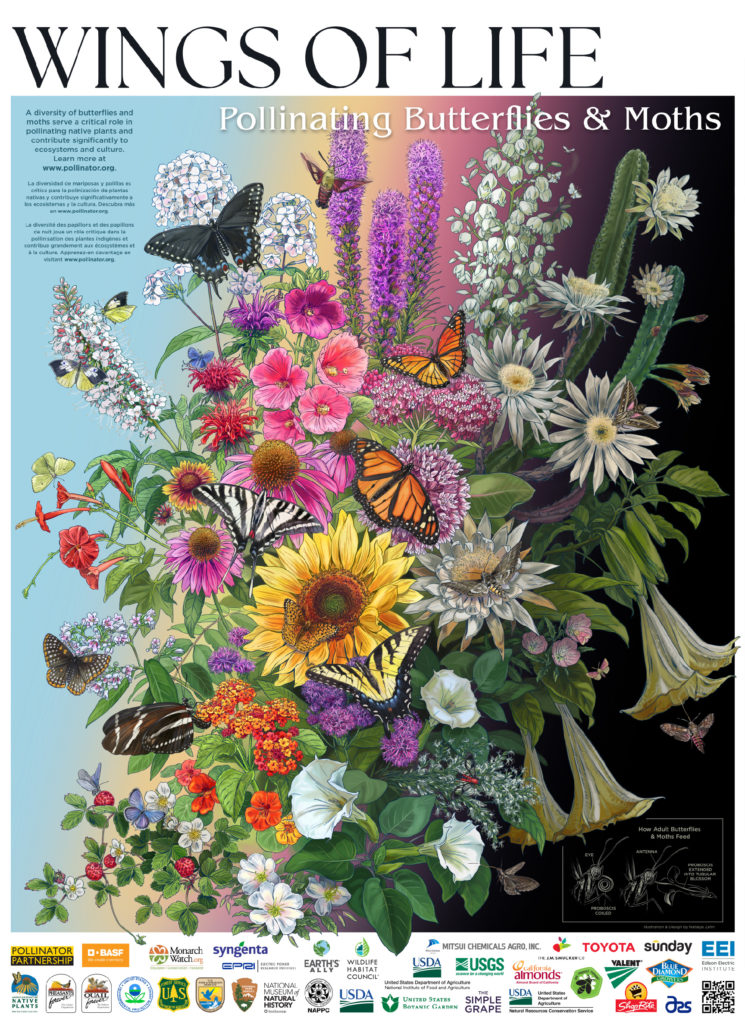Where Are The Monarchs Now?
The first generation of the northern migration have reached their colonization grounds. Follow their journey at Journey North.
Pollinator Week – An Opportunity to Learn More & Share Your Successes of Supporting Pollinators

National Pollinator Week continues to steadily grow and garner more attention ever since its first designation back in 2008. Today it is an international celebration, promoting the valuable ecosystem services provided by bees, birds, butterflies, bats, beetles, moths, wasps, and flies.
This year, Pollinator Week takes place June 20-26, with numerous virtual and in-person gatherings, webinars, planting sessions, garden and farm walks, and monument lightings. Pollinator Partnership (P2), the organization that spearheaded and maintains many of the events of Pollinator Week, provides a Pollinator Week map showing the locations of these activities occurring all across North America. Some activities you can participate in include:
- Begin your own or join a social media campaign
- Highlight Pollinator Week in a newsletter, blog, or magazine
- Host a pollinator-themed meal or mixer
- Host a pollinator planting day
- Build native bee houses or pollinator habitat
- Share your story in My Pollinators – MyStory!
In addition to specific Pollinator Week activities, Farmers for Monarchs encourages you to participate in community pollinator-focused science events hosted across the country throughout the year, such as identifying plants, monitoring eggs and caterpillars, and guided butterfly walks. To give you more ideas, check out some of the events and programs our members have led in the past.
Pollinator Partnership also provides a series of Fast Facts about supporting pollinators on its website, including a series of suggestions specifically for farmers and ranchers. Most of the suggestions will sound familiar as they reiterate suggestions offered by Farmers for Monarchs:
- Increase the numbers of pollinators on your agricultural lands. This will support other wildlife such as birds and game animals, improve the quality of water runoff, decrease your soil loss, and reduce your need for expensive pesticides. By cooperating with government programs for improving pollinator habitat, you may be qualified for financial support. Check with your local state extension office or soil conservation district.
- Learn how to reduce the direct exposure of pollinators to pesticides and how to protect critical nesting sites and food sources for beneficial insects & pollinators.
- Restore pollinator friendly practices at your farm. Study the habitat on your land: look for areas that can support all kinds of pollinators and other wildlife.
- Renew forage and nesting habitats by adding flowering plants, hedge rows, butterfly way stations and other shrubs.
- Expand your efforts. Use reduced-tillage practices (many native bees live in the soil). Start to develop riparian (streamside) zones for wildlife habitats and corridors. Allow crops to bolt to give these pollinators additional food sources and to encourage them to stay around for when you have need of them.
Pollinator Week not only shines a spotlight on both the necessity and plight of monarchs and other pollinators, it is also an opportunity to showcase the efforts already underway to support those pollinators. Your efforts are making a difference with monarch populations rebounding in 2021. But there’s still work to do done. Take the opportunity to share advice on planting pollinator habitat, your experience utilizing federal and local programs supporting pollinator health, and your successes resulting from your commitment.
While supporting pollinators requires year-round attention and dedication, we hope farmers and land managers see Pollinator Week as an opportunity to share with others the work you are doing to support pollinators and the positive results that have come from it. Don’t miss this opportunity to share broadly your experience and impact.
If you have questions related to planting pollinator habitat, we’re here to help. Call the Pollinator Habitat Help Desk at (337) 422-4828 or (337) HABITAT or find your state on our State Planting Resources webpage.
